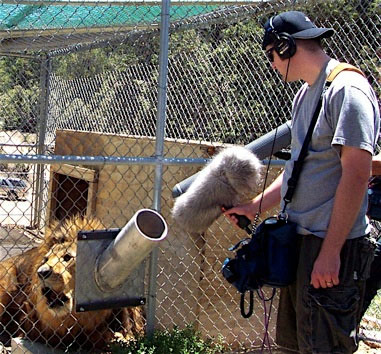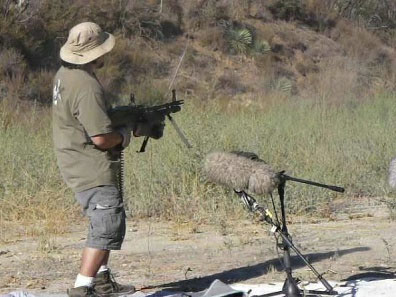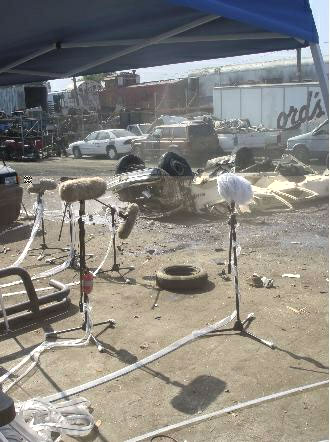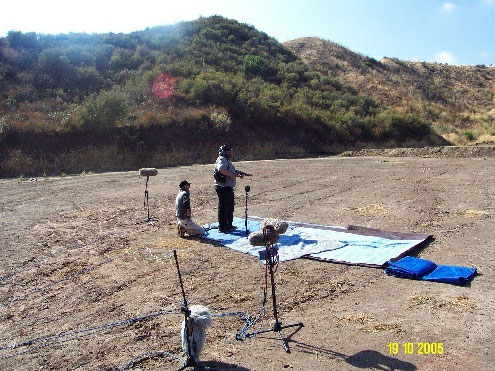Stay Up To Date With Us!
We will never spam you or share your email address.
Game Sound Design Strategies
GSD StrategiesCheck out the gamesounddesign.com strategies when you are feeling creatively uninspired. Each random strategy will present you with a new avenue to pursue. Give them a try!
Game Sound Design Glossary
GSD GlossaryOur game audio glossary has all the sound terms you have been wondering about. Game audio can be confusing enough without having to deal with a new technical language. We are constantly updating the database with new terms that relate to not only game audio but game developer terms as well.
Game Sound Design Interviews Chuck Russom
Interview by George Spanos
Game Sound Design: Hi Chuck, thanks for participating in the very first installment of the Game Sound Designer Interviews on gamesounddesign.com.
Taking a quick glance at your credit list, it's obvious you have a passion for sound. What motivated you to become a game sound designer?
Chuck Russom: I think that growing up with Star Wars around, there was always that hightened awareness of sounds. I've probably been using my mouse to make the sounds of lightsabers, blasters, R2D2, and Chewbacca, for most of my life. So that has always been there.
Musically, I've played the drums since elementary school. I picked up guitar in high school. I was pretty sure going into college that I wanted to do something related to music. But I didn't consider being a musician as a viable career option. That's when I discovered recording engineering and production. It seemed like the perfect field for me to pursue.
For years I had been influenced by experimental/noise guitar music like Sonic Youth. I was fascinated by instruments making sounds that they were not meant to make. I was always buying new guitar effects pedals, and exploring new sounds with my guitars.
Then I discovered Nine Inch Nails and became heavily influenced by The Downward Spiral album. I had never heard sounds like that before. I read articles about how Trent Reznor used Protools to process and mangle his sounds. I became really interested in using a computer to process and destroy music. This was well before Protools LE, Protools was still very expensive, and not something for the home user. I got a copy of Soundforge and just started messing around, recording things into the computer and editing/processing the sounds.
Then the music industry started to die. Suddenly the producer/engineer career path didn't look very promising. My knowledge of Soundforge lead to my first game job offer. The game industry was really starting to grow, I took the job as something to do until I figued out what I wanted to do with my life. And I've been doing it ever since!
GSD: A number of the games you have worked on, including Medal Of Honor and Call Of Duty, feature a stunning set of realistic weaponry sounds. What do you think are some of the hardest challenges when designing a game based around ultra realistic weapon sounds?

CR: One of the biggest challenges is giving each gun its own distinct sound. You could have 30-40 different weapons in these games and after a while, guns really start to sound the same. You also need to make sure the sound feels right for the weapon in the game. It doesn't matter how cool your sound is, what matters is how the sound mates with the use of the weapon in game and how it makes the player feel. Sound (along with vibration) provides the feedback to the player. It gives them a connection to the weapon.
GSD: When do you find that a lot of the distinct weapon sound design comes together for a title? During implementation while incorporating dynamic in-engine mixing and/or plugins or is it purely how the sounds have been recorded and manipulated in your DAW?
CR: All of the above! Without great recordings, it is really difficult to design good gun sounds. Designing guns for games is really a two step process. First, you need to be able to design great sounding assets from whatever source you are using. But that alone is not going to mean that once the sounds are in the game that they will fit. To me, a sound is never finished until it is implemented in the game and works in context. You can design the most amazing sound ever in your DAW, only to find that because of the way it works in game, or due to other sounds that are happening at the same time, that your amazing asset sounds terrible in the game. Really, this is the same for any sound that you develop for a game.
GSD: Can you share a few tips with us for how to successfully record weapons?
CR: In my opinion, these are the 5 most important elements to weapon recording:
-Preparation
-The environment you record in
-A Weapon Handler who understands your needs
-A lot of ammo
-A lot of microphones
You need to know what you expect to get out of the recordings before you go out and record. Do you need multiple distances? How distant? What type of gun sound are you going for? Which guns will give you the sounds you are looking for? You really need to do your research first, then get the recording sessions set up.

The environment you record in will have a greater effect on your sound than anything else. When we recorded the guns for Quantum of Solace, we actually scouted several locations. At each location we fired and recorded test shots. Back in the studio, I went through the tests and picked the location that I felt gave me the sound I was looking for.
Having a good weapon handler is key. Time is money on these type of sessions. You really want someone who understands what you need. Make sure that you lay out your expectations ahead of time. A good weapon handler is going to have the weapons you need, or they can get them, and the weapons will be well maintained. So you shouldn't have a lot of breakdowns during the shoot, and they'll probably have a backup weapon if one does fail.
You have to be willing to fire a lot of ammo. Recording in the field, you are fighting with other sounds in the environment; air traffic, insects/birds, wind, etc. You will also have weapon jams and malfunctions. You need to budget enough ammo to make up for lost takes due to these issues. You also want a good variety of shots/bursts to pick from when doing your sound design. If I'm recording a full auto weapon, I really want to have at least a couple hundred rounds of ammo per weapon, just to be on the safe side.
Record to as many channels as you can, from as many different perspectives as possible. For the best designed gun sounds, you will want to build mixes from tracks that are mic'd from different perspectives. Often, you will not know until you are in the studio which mics/perspectives work best for the sounds you are trying to design. So it is to your benefit to record with as many different mics, set up in as many different positions as possible.
GSD: What are your favorite pieces of field recording equipment?
CR: Microphones are my favorite piece of equipment. They are like paint brushes, each mic is useful for certain jobs. They also never get obsolete.
My go-to mic is a Neumann RSM191 stereo shotgun. That mic never leaves its shockmount/windscreen and is usually the first mic I grab if I'm running out to record something. I also love the Sennheiser MKH line of mics. I have a MKH416, MKH40, and two MKH800's. The Sennheiser mics have very little self noise and pick up a lot of low end. If I'm recording something quiet, or something that I really want to pick up the low end on, I usually grab one of the Sennheisers.
My two favorite mics for gun recording are the RSM191 and the MKH416. I have had a 416 on every gun recording session I've ever done.
GSD: You've worked at some of the top development studios and you are now freelance. What would you say some of the biggest differences are between working in-house versus freelance?
CR: I could write a book on this topic! I will just highlight a few of the major differences. Working in-house is an important career step for anyone who wants to work in games. You just don't get the same kind of exposure and interaction to the development process as a freelancer. I always recommend to people that you start off in house, build your skills and experience, and then decide if a freelance career is viable for you.
Both situations have their pluses and minuses. When you work in house, you know what projects you are working on, what your tasks will be, you are provided with equipment and a space to work, and you receive a steady paycheck. At the same time you are required to work during the hours which your employer sets for you, in the location that your employer sets for you, and probably using the equipment that your employer decided that you should use. You are tied to projects that you are assigned to (which may not be your preferred projects) and you cannot take on side work outside of the company you work for.

As a freelancer you are able to set up your own workspace. Decide on the type of equipment you will use. And to some extent, set your working hours. You also have more freedom in choosing the projects you work on. At the same time, you must purchase and maintain all of your equipment, and pay for the space you are working in. You have to be able to motivate yourself to get working and resist the urge to revel in your freedom. As a freelancer, you have to understand that you are running a business. You will spend a great deal of time looking for work. Invoicing and following up on invoices with clients. Marketing and developing your brand. Researching and budgeting equipment purchases. You end up doing a lot of tasks that have nothing to do with audio. If you are not good at or don't enjoy business, then freelancing is probably not a good career choice.
When you work in-house you generally work on a project for its entire duration, or close to. You come on early, when there are little to no tools, there isn't a working build, everything is still just an idea on paper. You end up working on the project for months or years and see it through to the end. As a freelancer, you could be brought on during any phase of a project. You might be on for a long time, or you might just be brought on for a short period to help address a specific need. It never really is your project.
Finally, when it comes down to creative freedom and control, working in-house you often have a lot of creative control and sometimes you have complete creative control. As a freelancer, you have to make sure the client is happy. Sometimes the client may want to go in a direction that you do not agree with, but at the end of the day, it is their project and not yours. You have been hired to help them fufill their vision. You can't have an ego and you can't loose sight of the fact that you job is to serve the client. That said, most likely you were hired for a reason, and many clients will welcome your input and give you some creative freedom.
GSD: What are your favorite types of sounds to design?
CR: I always welcome the chance to design gun sounds. Its something I have a lot of experience in and every time I get the chance to try something new and better my process.
I also enjoy designing sounds that are not based in reality; creatures, magic, etc. Its always a challenge to come up with sounds for something that doesn't have a real-life reference. These are the type of sounds that really make you better at what you do.
GSD: We've all had those times when trying to create a sound and it just isn't working. What do you find helps you overcome that sort of "writer's block"?
CR: I find there are two types of "writer's block". The first type is when you just cannot figure out how to make a certain sound. You've used up all of your ideas and nothing is working. The best cure for this is to seek out examples of similar sounds (in other games, movies, etc) and listen over and over again and try to figure out how those sounds were created. It also helps to talk to other sound designers and see what ideas they have or what they've tried in similar situations.
The more traditional type of "writer's block" is where your creative energy is just gone. You can't even begin to think creatively. You are burned out or unmotivated or whatever. The best cure I've found is to first stop working and walk away. Don't try to force anything at this point because it will just be crap.

I'll try to find something that inspires me. It could be a favorite movie/tv show, a game, a book, a drive in the mountains, just something that is removed from my work. I recently found myself having a bit of "writer's block" while crunching on a deadline for a project. I put aside my work and started watching music videos on Youtube. After a 1/2 hour or hour of listening to some of my favorite music, I found myself inspired to get back to work.
GSD: Can you name a few games that have been released in the past year that have inspired you?
CR: Two recent games that really stand out to me are Uncharted 2 and Peggle (yes, that Peggle)-editor's note: yours truly has also been addicted to playing Peggle as of late-.
Uncharted 2 has some of the best dialog that I have ever heard in a game. The writing, the delivery, the characters, are all top notch. I wish all game dialog was this good. I'm also impressed by how detailed the sound is. Especially the movements and foley. You can tell that a lot emphasis was placed on implementation.
Peggle is a simple casual game. The audio does a great job providing feedback to the player. Every "character" in the game has their own distinct sounds. The powerups, bonuses, etc, are all very distinct. You can play the game with your eyes closed and know exactly what is happening. Casual games are usually overlooked for quality, but in this case, Peggle is an example of both great game design and great audio.
GSD: Outside of audio, what hobbies and activities do you find help to influence your sound design?
CR: A few years ago I realized that all of my hobbies involved music, sound, or games. I needed something that was far from what I did for a living. So I started shooting guns (at targets). I found it to be a great stress relief. It also took me outside, which is something that those of us who work in front of computers all day really need!
Firing guns and being around guns as they are fired gives you a perspective that you don't get from listening to sounds in a studio or theater. You don't just hear the shots as you fire, you feel them. You learn to understand how the guns work. Needless to say this has had a tremendous impact on my weapon sound design.
GSD: Do you have any special "nuggets of advice" for people hoping to break into the industry?
CR: As games become more detailed and more complicated, implementation becomes more and more the key to great audio. Implementation is usually delegated to junior members of the audio team.
Anyone who is looking to break in to game audio should make implementation their focus. Download and learn tools such as Unreal, Wwise, and Fmod. Put together a demo that highlights your skills as an implementer. Creating sound effects is the easy part. Getting them sounding good in the game is the hard part.
Chuck Russom's Website: russom.net
Chuck Russom Selected Credits:
Medal of Honor (2010) - Sound Designer
Dante's Inferno - Sound Designer
007: Quantum of Solace - Audio Lead
God of War 2 - Audio Lead
God of War - Sound Designer
Warhawk - Sound Effects Recording
Medal of Honor: Pacific Assualt - Audio Lead
Call of Duty - Audio Lead

